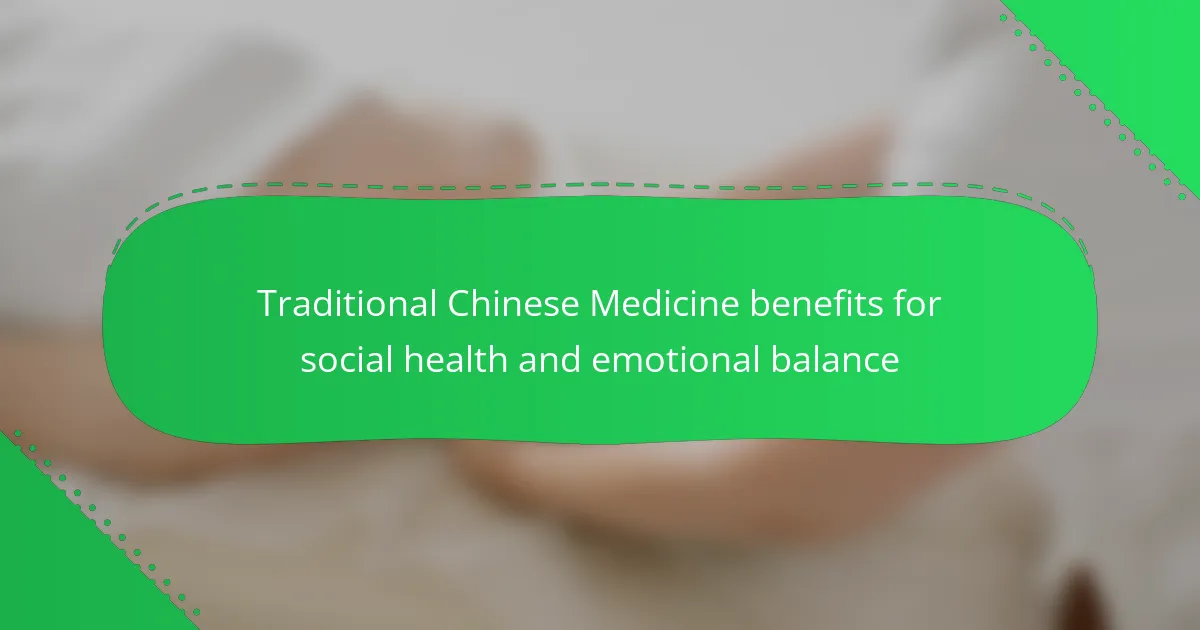Traditional Chinese Medicine provides essential benefits for emotional balance, including stress reduction and improved mood. Techniques like acupuncture and herbal remedies enhance resilience and foster community connections. This holistic approach emphasizes the link between physical and emotional health, promoting overall social well-being. Additionally, practices such as Qi Gong encourage mindfulness and strengthen interpersonal relationships.
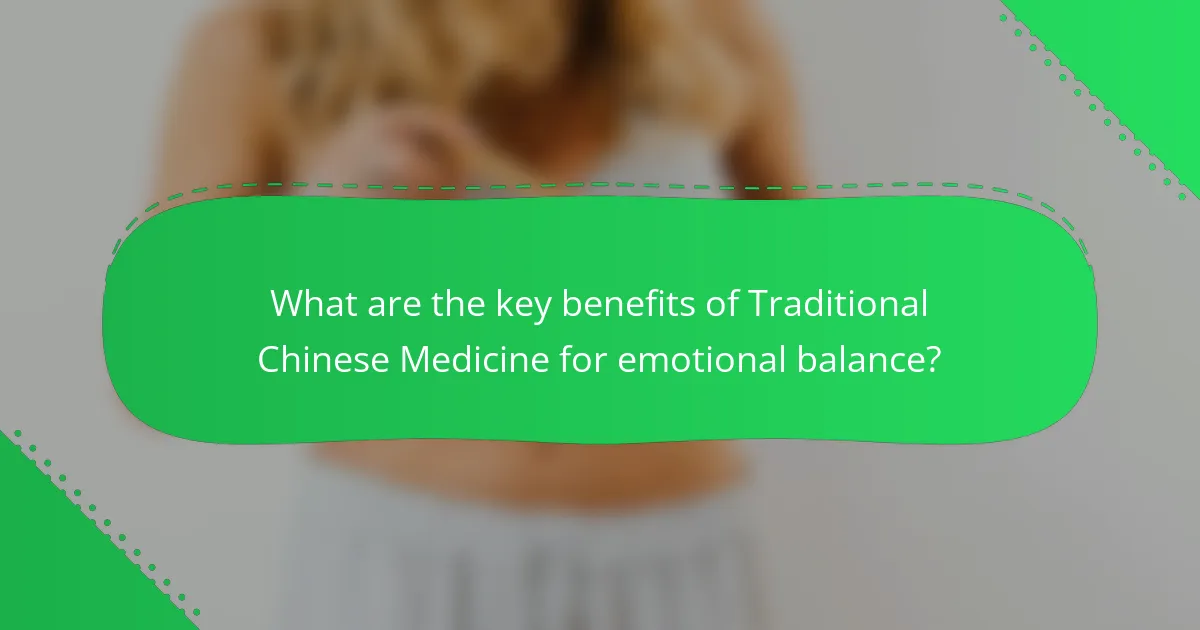
What are the key benefits of Traditional Chinese Medicine for emotional balance?
Traditional Chinese Medicine offers several key benefits for emotional balance, including stress reduction, improved mood, and enhanced resilience. Techniques such as acupuncture and herbal remedies help regulate energy flow and restore harmony. These practices can alleviate anxiety and depression, promoting overall emotional well-being. Additionally, Traditional Chinese Medicine emphasizes the connection between physical and emotional health, fostering a holistic approach to social health.
How do acupuncture and herbal remedies contribute to emotional well-being?
Acupuncture and herbal remedies enhance emotional well-being by promoting balance and reducing stress. Acupuncture stimulates specific points, releasing endorphins and improving mood. Herbal remedies, such as adaptogens, support the body’s response to stress and anxiety. Together, these practices foster emotional resilience and social health. Traditional Chinese Medicine emphasizes holistic approaches, addressing both physical and emotional aspects of health.
Why is Qi Gong considered beneficial for mental health?
Qi Gong is beneficial for mental health as it enhances emotional balance and reduces stress. This practice, rooted in Traditional Chinese Medicine, fosters mindfulness and promotes relaxation. Regular Qi Gong sessions can lower anxiety levels and improve overall mood. Studies indicate that participants often report increased feelings of tranquility and improved social interactions. Additionally, the meditative aspects of Qi Gong can help individuals develop a deeper connection with their emotions, facilitating emotional resilience.
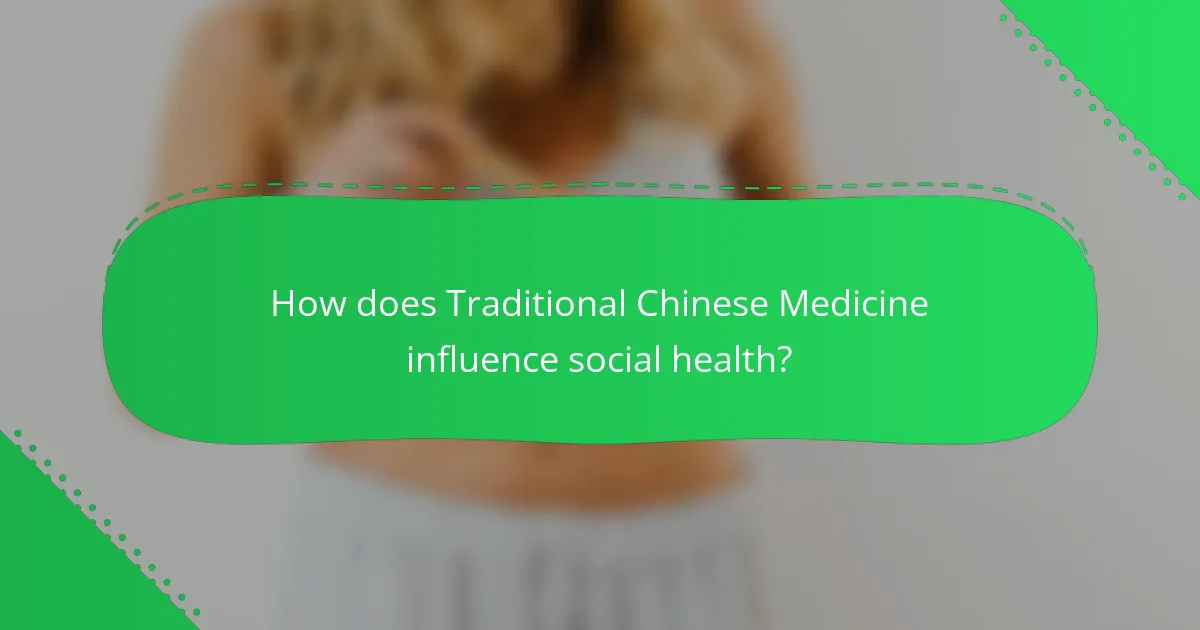
How does Traditional Chinese Medicine influence social health?
Traditional Chinese Medicine enhances social health by promoting emotional balance and community well-being. Its holistic approach fosters interpersonal connections through practices like acupuncture and herbal remedies, which alleviate stress and anxiety. These methods encourage social engagement, reducing feelings of isolation. Furthermore, Traditional Chinese Medicine emphasizes harmony, leading to improved relationships and community cohesion. As a result, individuals experience enhanced social support networks, contributing to overall emotional stability.
What role does community play in the practice of Traditional Chinese Medicine?
Community plays a vital role in Traditional Chinese Medicine by enhancing social health and emotional balance. Engaging with a supportive community fosters connections, which can alleviate stress and promote mental well-being.
Traditional Chinese Medicine emphasizes holistic healing, integrating physical health with emotional and social aspects. Group practices, such as tai chi or qigong, create social bonds that contribute to a sense of belonging and emotional stability.
Research indicates that community involvement can lead to improved health outcomes. For example, individuals participating in community wellness programs report higher satisfaction and lower levels of anxiety.
The unique attribute of Traditional Chinese Medicine lies in its collective approach, where shared experiences and support systems amplify the benefits of individual treatments. This interconnectedness not only aids in recovery but also nurtures a balanced emotional state.
How can Traditional Chinese Medicine foster social connections and support?
Traditional Chinese Medicine fosters social connections and supports emotional balance through community practices and holistic approaches. Group activities such as tai chi and qigong encourage social interaction and bonding. These practices promote physical health, which enhances emotional well-being and reduces stress. Additionally, acupuncture and herbal remedies can improve mood and foster a sense of community through shared experiences in healing. The emphasis on balance and harmony in Traditional Chinese Medicine aligns with social support systems, reinforcing connections among individuals.
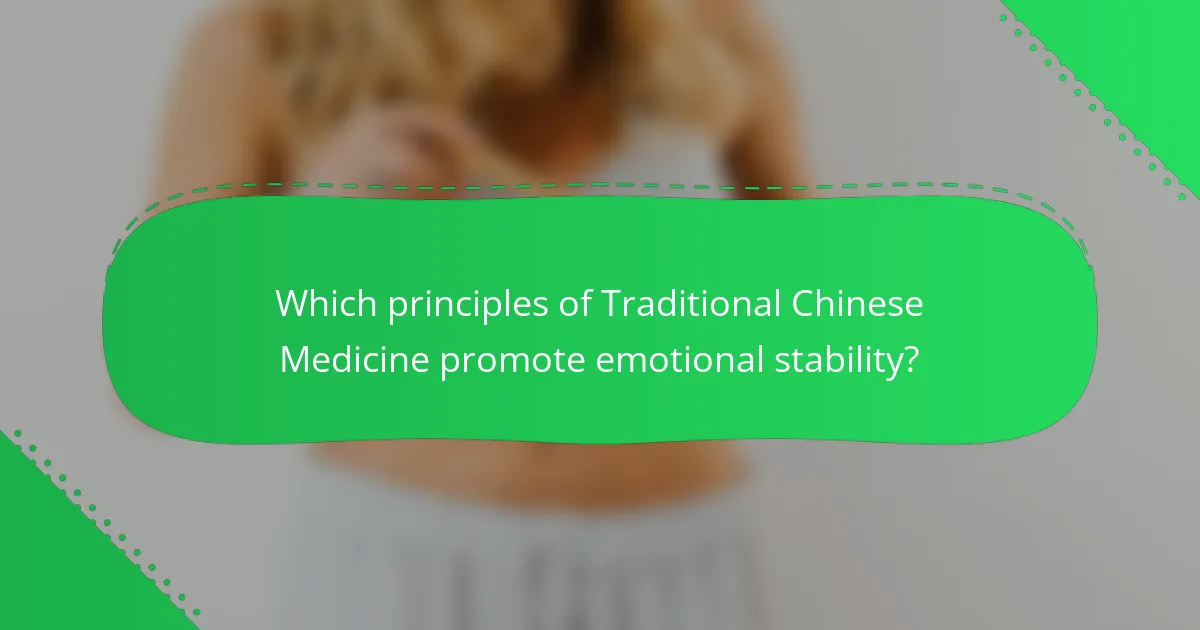
Which principles of Traditional Chinese Medicine promote emotional stability?
Traditional Chinese Medicine promotes emotional stability through principles that emphasize balance and harmony. Key concepts include Qi (vital energy), Yin-Yang balance, and the Five Elements theory. Qi cultivation through practices like Tai Chi and acupuncture enhances emotional resilience. Yin-Yang balance fosters mental equilibrium, while the Five Elements connect emotions to specific organs, guiding therapeutic approaches. These principles create a holistic framework for achieving social health and emotional balance.
How does the concept of Yin and Yang relate to emotional health?
The concept of Yin and Yang is essential for emotional health as it promotes balance. Traditional Chinese Medicine emphasizes harmony between opposing forces, helping individuals manage stress and emotional turmoil. By understanding and applying Yin and Yang principles, one can achieve emotional stability and resilience. This balance fosters social health, enhancing relationships and community connections, which are vital for overall well-being. Integrating these principles into daily life can lead to improved emotional regulation and a greater sense of peace.
What are the Five Elements, and how do they impact emotional balance?
The Five Elements in Traditional Chinese Medicine are Wood, Fire, Earth, Metal, and Water. They influence emotional balance by representing different emotional states and interactions. Each element corresponds to specific emotions, such as Wood for anger and Fire for joy. Understanding these relationships helps individuals maintain emotional equilibrium and social health. For example, balancing these elements can mitigate stress and enhance interpersonal relationships. This holistic approach fosters overall well-being and emotional resilience.
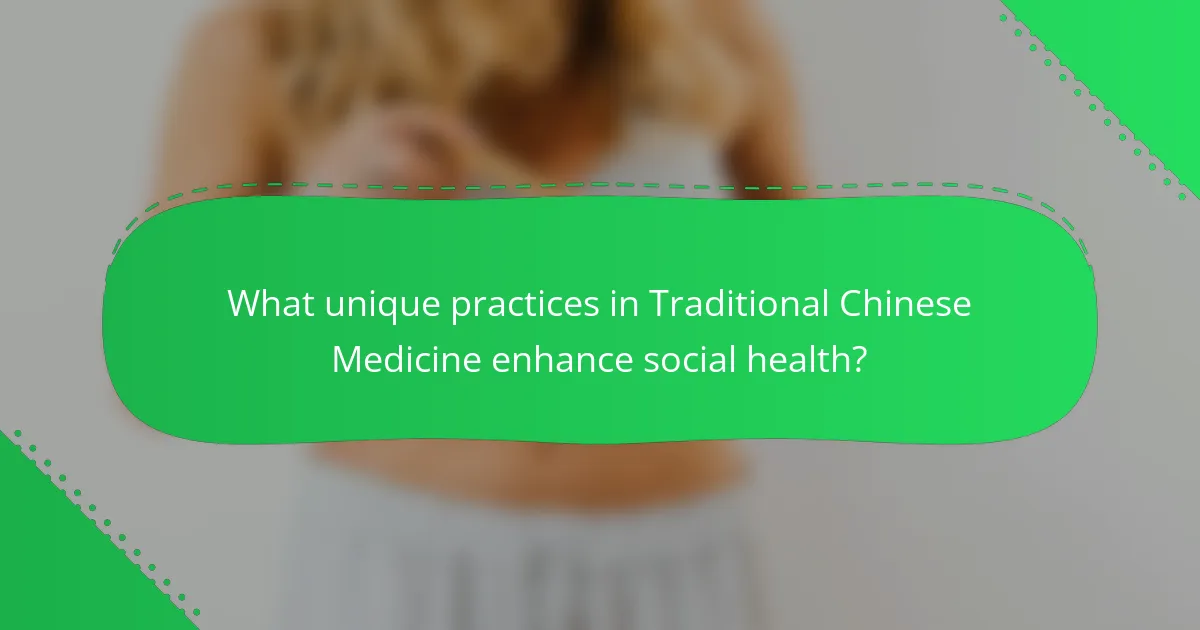
What unique practices in Traditional Chinese Medicine enhance social health?
Traditional Chinese Medicine enhances social health through practices like acupuncture, herbal remedies, and Qi Gong. These methods promote emotional balance and foster community connections.
Acupuncture reduces stress and anxiety, leading to improved interpersonal relationships. Herbal treatments, such as adaptogens, help stabilize mood and enhance resilience. Qi Gong encourages mindfulness and social interaction, strengthening bonds within communities.
These practices not only support individual well-being but also create a harmonious social environment, emphasizing the interconnectedness of health and relationships.
How does Tai Chi facilitate social interaction and community building?
Tai Chi enhances social interaction and community building through shared practice and connection. Participants engage in group sessions, fostering relationships and mutual support. This collective experience promotes emotional balance, reducing stress and enhancing well-being. Studies show that group activities like Tai Chi can lead to increased social cohesion and improved mental health outcomes. The unique attribute of Tai Chi lies in its combination of physical movement and mindfulness, creating an inclusive environment for individuals of all ages.
Which group therapies in Traditional Chinese Medicine support emotional healing?
Group therapies in Traditional Chinese Medicine that support emotional healing include Tai Chi, Qigong, and acupuncture. These practices enhance emotional balance by promoting relaxation and stress relief. Tai Chi combines gentle movements with mindfulness, improving mental clarity. Qigong focuses on energy flow, fostering emotional stability. Acupuncture targets specific points to alleviate anxiety and depression. Together, these therapies contribute to overall social health and emotional well-being.
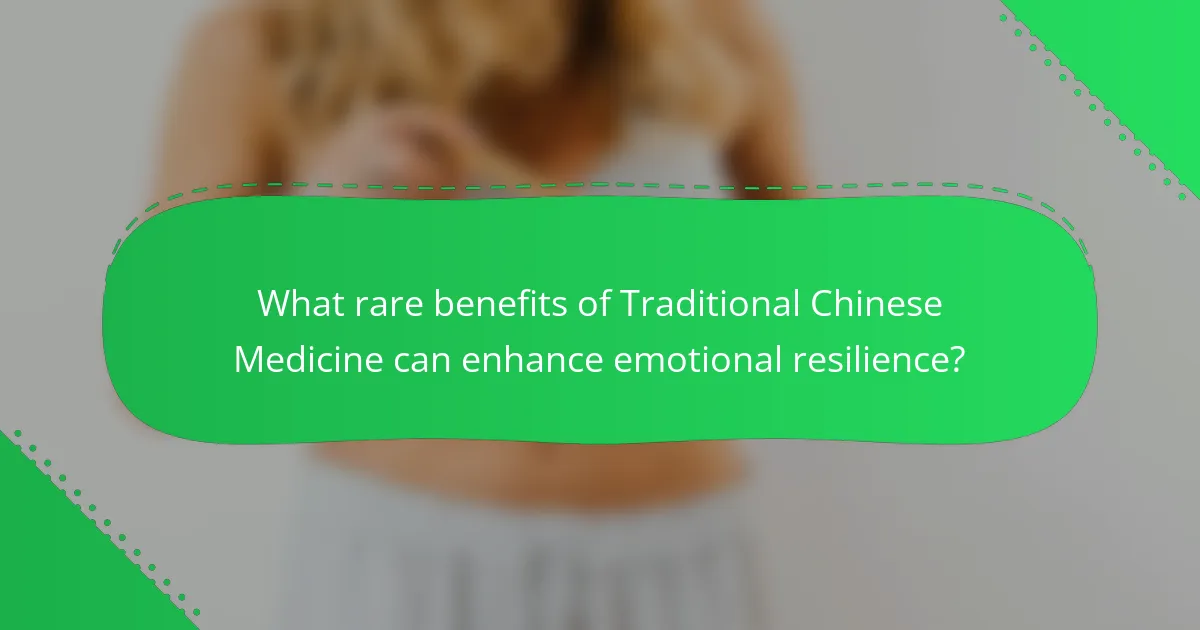
What rare benefits of Traditional Chinese Medicine can enhance emotional resilience?
Traditional Chinese Medicine offers unique benefits that can significantly enhance emotional resilience. Techniques like acupuncture and herbal remedies promote mental clarity and emotional stability, fostering a balanced state of mind.
One rare benefit is the use of adaptogenic herbs, which help the body adapt to stress and reduce anxiety levels. For example, herbs like Rhodiola can improve mood and energy. Another unique aspect is the integration of mindfulness practices, such as Tai Chi, which cultivates emotional awareness and resilience through movement and breath control.
Additionally, TCM emphasizes the importance of social connections for emotional health. By improving physical health through holistic methods, individuals often experience stronger interpersonal relationships, which further supports emotional resilience.
How can Traditional Chinese Medicine address specific emotional disorders?
Traditional Chinese Medicine effectively addresses emotional disorders through holistic approaches. Techniques like acupuncture, herbal remedies, and mindfulness practices balance energy and promote emotional stability.
Acupuncture stimulates specific points to alleviate anxiety and depression, enhancing emotional well-being. Herbal remedies, such as adaptogenic herbs, support stress reduction and emotional resilience. Mindfulness practices foster self-awareness, helping individuals manage their emotions more effectively.
These methods are tailored to individual needs, ensuring personalized care. By focusing on the interconnectedness of body and mind, Traditional Chinese Medicine provides a comprehensive framework for addressing emotional disorders.
What innovative approaches are emerging in Traditional Chinese Medicine for social health?
Innovative approaches in Traditional Chinese Medicine (TCM) are enhancing social health and emotional balance through integrative practices. Techniques like acupuncture and herbal therapy are being combined with modern psychology to address emotional well-being.
Community-based TCM initiatives foster social connections, promoting group acupuncture sessions and wellness workshops. These practices help reduce anxiety and depression, thereby improving social interactions.
Mindfulness practices, rooted in TCM, are gaining traction for their effectiveness in emotional regulation. Techniques such as Tai Chi and Qi Gong encourage mindful movement, enhancing mental clarity and social engagement.
Research indicates that TCM can improve overall life satisfaction, with studies showing significant emotional balance benefits in participants. This holistic approach to social health emphasizes the interconnectedness of physical and emotional well-being.
What are the best practices for integrating Traditional Chinese Medicine into daily life for emotional balance?
Integrating Traditional Chinese Medicine (TCM) into daily life can significantly enhance emotional balance. Key practices include acupuncture, herbal remedies, tai chi, and mindfulness meditation.
Acupuncture helps regulate energy flow, reducing stress and anxiety. Herbal remedies like chamomile and ginseng support emotional stability. Tai chi promotes relaxation and mental clarity through gentle movement. Mindfulness meditation fosters self-awareness and emotional regulation.
Incorporating these practices consistently can lead to improved social health and emotional well-being. Aim for daily sessions, even if brief, to experience cumulative benefits.
